(Total Views: 420)
Posted On: 04/08/2023 6:51:31 PM
Post# of 394
Global Battery Metals's two hot irons in the fire .............................
Utah
Lithium King brine lithium project in Utah, 100% owned
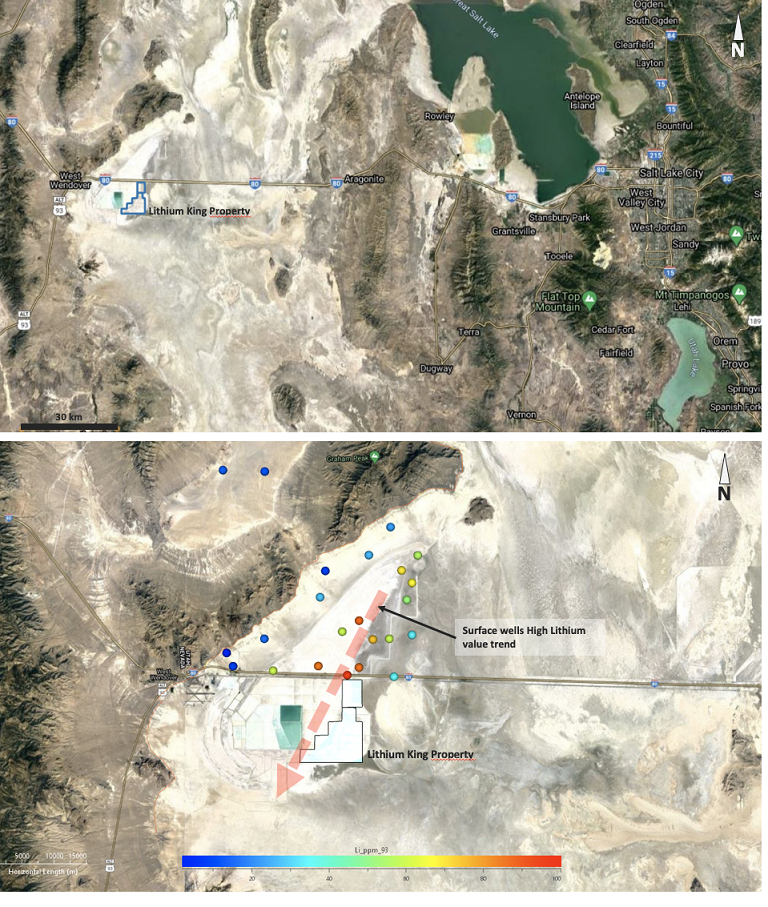
https://investorshangout.com/images/MYImages/...roject.png
https://gbml.ca/projects/lithium-king/
It is now Spring, news of drilling in Lithium KIng will be out any day
Extract from https://gbml.ca/site/assets/files/5539/gbml-presentation.pdf
• Maiden drill program targeting Spring 2023 start.
Drilling permit has been granted. Drilling will test for:
stratigraphy, brine composition and production metrics.
• Exploration mud rotatory drilling with wireline geophysics
to evaluate the stratigraphy and basement depth for the
Property area.
• Water sampling of drill holes using in-hole packer
equipment to test for lithium enrichment and deleterious
element content of the brine.
• Further geophysical data acquisition will be conducted by a
combination of gravity and EM data acquisition
• Once drilling has been completed and assay
results are returned, GBML intends to produce a
43-101 compliant mineral resource estimate.
• GBML will explore Direct Lithium Extraction
(DLE) technology partners for low-cost and
sustainable processing
Extracing lithium from brine lithium - Direct Lithium Extraction (DLE) method
Lithium is a highly reactive alkali metal that offers excellent heat and electrical conductivity, which makes it ideal for several uses such as EV and energy storage. However, because of its high reactivity, pure elemental lithium is not found in nature but is instead present as a constituent of salts or other compounds such as spodumeme (chemical formula: LiAlSi2O6).
Currently, there are only two commercial lithium production sources, spodumene in hard rocks and naturally occurring lithium-containing brine.
Direct Lithium Extraction (DLE) is a proven technology, with established producing projects based on DLE in China and South America. The technology allows the extraction of lithium from the brine producing high purity lithium chloride, without the need for evaporation, resulting in no depletion from the aquifer or harm to the local environment. DLE technology also offers higher recoveries and purities than other forms of lithium extraction.
DLE technology consists of several chemical processes that allow for fast isolated lithium production into saleable forms of lithium. This can be done via three main methods:
Adsorption: using sorbents to physically adhere to the lithium for selective removal. After the sorbent is loaded with the lithium chloride, it’s washed with a diluted lithium chloride stream to remove unwanted ions, and then washed a second time to unload the lithium chloride. The latest sorbent being tested is a lithium aluminum layered double hydroxide chloride sorbent, or LDH. As described in a recent study published by Environmental Science & Technology, this method doesn't require an acid wash or other chemicals, which ultimately makes it more friendly.
Ion Exchange: These systems separate ionic contaminants from solution through a physicochemical process where undesirable ions are replaced by other ions of the same electrical charge. Lithium recovery by ion exchange can change with a simple adjustment in pH, temperature, or stream composition (and the same goes for other lithium extraction methods), but researchers also believe this method can recover roughly 90% of the lithium present.
Solvent extraction: this process involves capturing lithium either chemically or physically and transforming it into Lithium Chloride.
Drill assays from clay lithium deposits of Surge Battery Metals, Global Battery Metals's neighbor in Nevada, sent share price surging from 17 cents to 45 cents.
https://stockcharts.com/h-sc/ui?s=NILI.V&...7939912081
https://surgebatterymetals.com/surge-battery-...m-project/
https://surgebatterymetals.com/surge-battery-...m-project/
~~~~~~~~~~~~~~~~~~~~~~~~~~~~~~~~~~~~~~~
Ireland
Hard rock Lithium project in PLA 1597 (Knockeen-Carriglead area), the County of Carlow, Province of Leinster, Ireland. (Global 90%, Technology Minerals 10%, Global is the operator responsible for all exploration expenses)
https://www.google.ca/maps/place/Carlow,+Irel...0vMDJoNHc0
https://www.google.ca/maps/search/Knockeen+Ca...a=!3m1!1e3
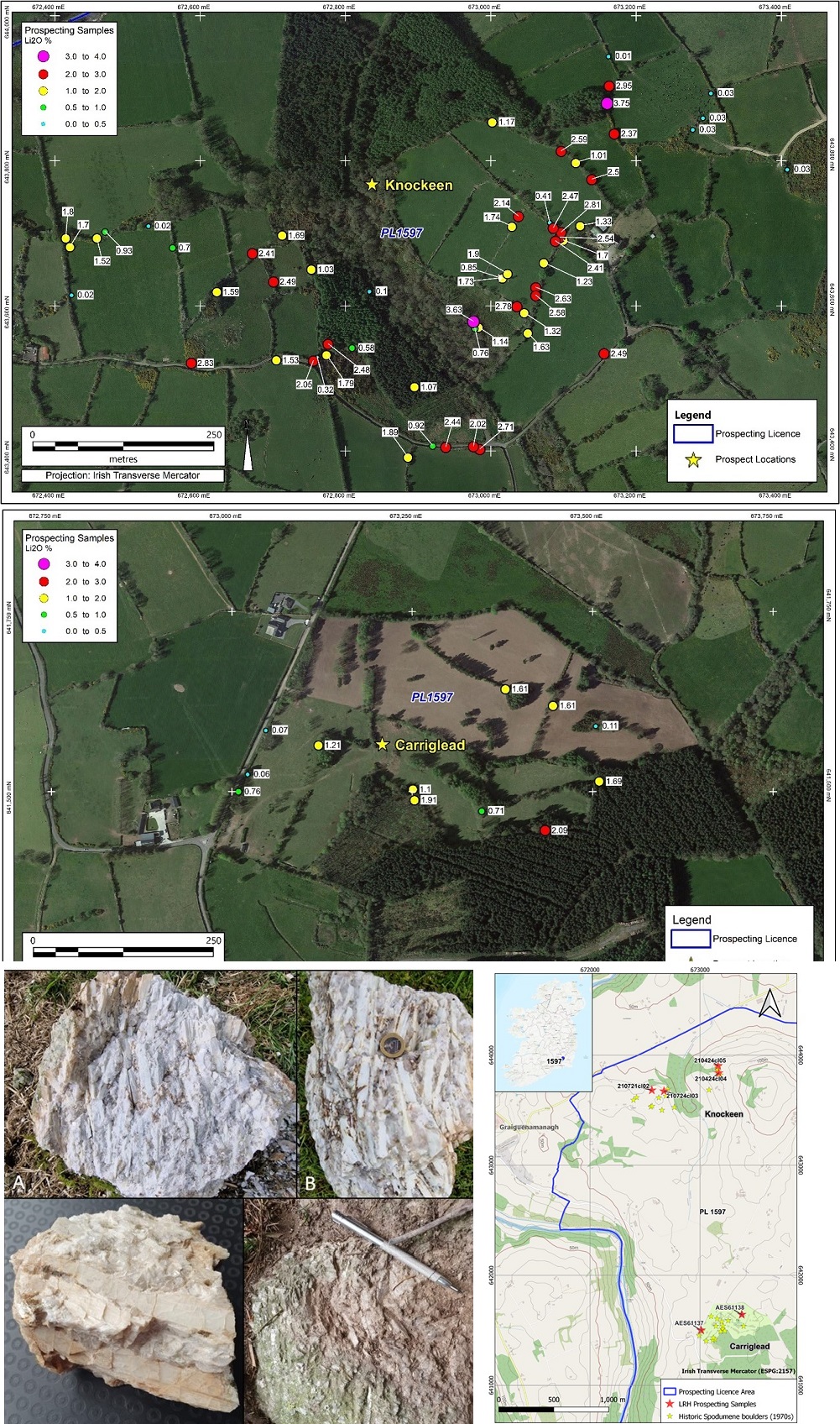
https://investorshangout.com/images/MYImages/...iglead.jpg
https://gbml.ca/projects/nw-leinster-lithium/
Extract from Global's March 20 news release and from Technolgy Minerals's March 22, 2023 news release:
Following the previously reported identification of a lithium bearing spodumene pegmatite surface boulder train on PLA 1597, key updates include:
* A detailed deep overburden (base of till) program was recently completed for a total of 373 samples covering an area of 600m x 450m over the location of an extensive spodumene pegmatite float boulder train and an associated historically reported trenched bedrock occurrence;
* The interpreted geochemical results indicate the potential discovery of up to six LCT (lithium-cesium-tantalum) pegmatite dikes across the Knockeen target area;
* Follow-up drill program plans, currently calling for up to nine drill pads (with two holes planned per pad), are being finalized;
* ALS Laboratories (Loughrea, Ireland) analysis included comprehensive testing for a specific suite of elements which includes lithium as well as multiple rare earth elements of which cesium and tantalum are typically associated with this type of LCT Pegmatite target;
* Drilling permit submissions are being finalized and will be submitted to the governmental regulatory body as part of the due process for standard screening procedures for drilling programs in Ireland and Europe; and
* A local area drill contractor’s availability has been secured and will be mobilized as soon as the permitting is completed.
The PLA 1597 licence, which was awarded to Technology Minerals' wholly owned subsidiary LRH Resources Limited ("LRH" on 22 March 2022, forms part of the Company's Leinster Property exploration block, which is operated under an exclusive Option and Earn-in agreement with Global Battery Metals Ltd ("GBML"
on 22 March 2022, forms part of the Company's Leinster Property exploration block, which is operated under an exclusive Option and Earn-in agreement with Global Battery Metals Ltd ("GBML" , (TSXV: GBML; OTCQB: REZZF; Frankfurt: REZ) with no project expenditure required by the Company.
, (TSXV: GBML; OTCQB: REZZF; Frankfurt: REZ) with no project expenditure required by the Company.
Alex Stanbury, CEO of Technology Minerals, said: “Our confidence in the Leinster Project is further evidenced by the latest encouraging research and testing results. With multiple new drilling targets identified, permit submissions are now being finalised to obtain clearance for the new drilling programme and we look forward updating shareholders of our progress.”
Michael Murphy, CEO of GBML, said, “These results are both exciting and informative. The deep overburden samples have helped us to zero in on a distinct set of drill targets and the Company has ambitious plans for spring drilling. The potential to drill up to six interpreted dikes along a lithium anomaly trend line across this claim has the team highly motivated about the entire property. We are told the drill permitting process in these areas of Ireland is relatively straightforward and our paperwork is being prepared with the intent to submit in a matter of days. Based on all of our research and testing, the potential to uncover further significant lithium occurrences along the recognized regional scale south-east Leinster LCT pegmatite corridor is a real possibility. Needless to say, we will be moving quickly to verify what we believe we are into.”
Exploration to date has included surface lithogeochemical sampling with an associated detailed deep overburden sampling grid – both yielding excellent results and when combined potentially confirming the presence of multiple LCT pegmatite dikes below surface at the Knockeen target on PLA 1597. The pegmatite dike targets are intrusive bodies that typically form swarms of several separate dikes which range in thickness and cross cut the granitic and metasedimentary host rocks. The dikes are typically composed of Spodumene (lithium aluminium silicate in the pyroxene family) as well as accessory minerals including quartz, feldspars and micas. While the lithium content of the samples collected to date are at very significant grades, the supporting trace element geochemistry of the other elements including the Rare Earth Elements (REEs) that occur naturally at very low levels are very important and significant indicators providing corroborative evidence for the presence of the dikes.
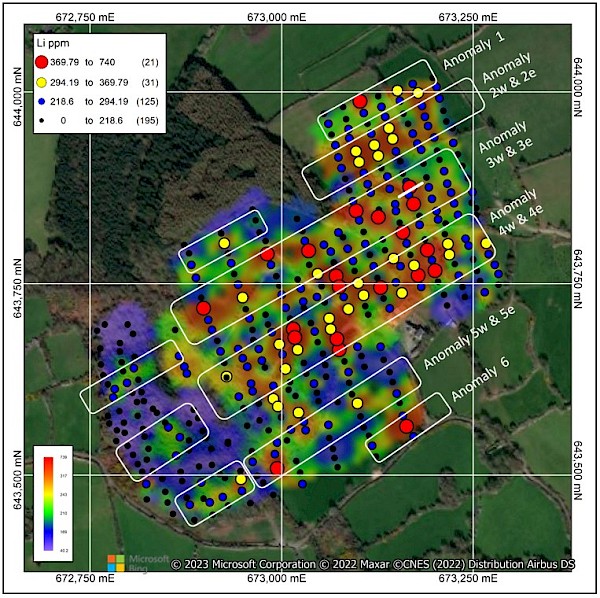
Figure 1: Deep Overburden sampling grid showing anomalous lithium (ppm)in linear trends across the Knockeen Prospect.
The Knockeen Prospect has now reached a significant confidence level to plan a staged diamond core drilling program to test the six anomalous geochemical trends. The drill program parameters are being finalized, including plans accounting for up to nine drill pad locations, and discussions are in hand with a drilling contractor. The drilling screening process has commenced with the governmental regulatory body. This process is a standard procedure for all drill programs in Ireland and across Europe.
During the recent and ongoing fieldwork, a total of 66 rock samples were collected and analysed. Assay results of the samples by ALS Laboratories reported Li2O% lithium contents ranging up to 3.75 % Li2O as reported in the press release date January 18, 2023.
In conjunction with this work the detailed grid comprising of 373 deep overburden (base of till) samples were collected over a closely spaced sample grid over 600m x 450m covering the area of the historical trench as well as the spodumene pegmatite float boulders. The results have been very encouraging and the multi-elemental results have been interpreted to show up to six clear linear anomalous trends which are anomalous in lithium, as well as the supporting REE elements of cesium and tantalum which combine to indicate the potential presence of LCT signature pegmatite dykes at shallow depths of between 1m – 7m below ground surface.
The area of the exploration is centred on a locality where a forty-year-old historical company report described a trench excavated at Knockeen Townland which uncovered in bedrock, a 1.8m wide spodumene-bearing pegmatite vein. However, no detailed laboratory assays or geological maps of the trench were reported at that time.
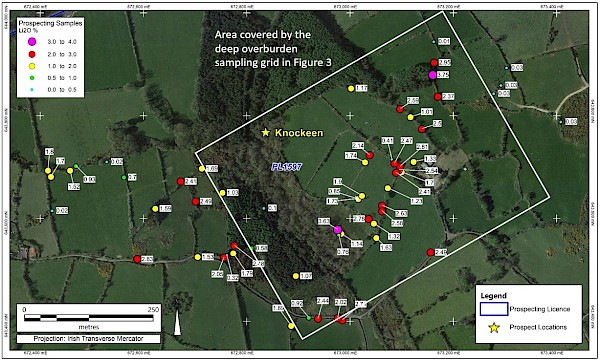
Figure 2: Location of the Knockeen prospect on PLA 1597 showing pegmatite analytical results* and the deep overburden sampling grid (*results previously reported PR 18/01/2023)
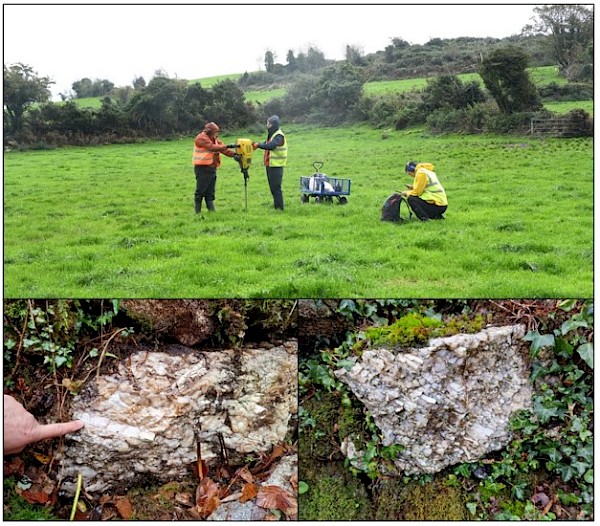
Figure 3: Deep Overburden sampling (top) and Spodumene pegmatite samples from Knockeen (bottom)
~~~~~~~~~~~~~~~~~~~~~~~~~~~~~~~~~~~~~~~
6 spodumeme pegmatites were found in PLA 1597 (Knockeen-Carriglead area), one of the 16 granted exploration licence areas including 7 licence areas granted in January 2023, most of the licence areas have not been explored yet, so there could still be more spodumeme pegmatites to be discovered. A spodumeme pegmatite is equivalent to a "gold vein" in orogenic gold deposits with long intervals of high grade lithium.
About Prospecting Licence in Ireland
https://www.gov.ie/en/service/apply-for-a-pro...department.
~~~~~~~~~~~~~~~~~~~~~~~~~~~~~~~~~~~~~~~
Process of extracting lithium from hard rock lithium deposits:
https://www.sgs.com/-/media/sgscorp/documents...cdn.en.pdf
~~~~~~~~~~~~~~~~~~~~~~~~~~~~~~~~~~~~~~~
Global Battery Metals also has a lithium property in La Poile, Newfoundland. Exploration and drilling is scheduled to begin in 2024.
The company also has a copper property in Peru which is optioned out to a mining producer for $5.7 million.
See corporate Presentation and latest news release: https://gbml.ca/site/assets/files/5539/gbml-presentation.pdf
Utah
Lithium King brine lithium project in Utah, 100% owned

https://investorshangout.com/images/MYImages/...roject.png
https://gbml.ca/projects/lithium-king/
It is now Spring, news of drilling in Lithium KIng will be out any day
Extract from https://gbml.ca/site/assets/files/5539/gbml-presentation.pdf
• Maiden drill program targeting Spring 2023 start.
Drilling permit has been granted. Drilling will test for:
stratigraphy, brine composition and production metrics.
• Exploration mud rotatory drilling with wireline geophysics
to evaluate the stratigraphy and basement depth for the
Property area.
• Water sampling of drill holes using in-hole packer
equipment to test for lithium enrichment and deleterious
element content of the brine.
• Further geophysical data acquisition will be conducted by a
combination of gravity and EM data acquisition
• Once drilling has been completed and assay
results are returned, GBML intends to produce a
43-101 compliant mineral resource estimate.
• GBML will explore Direct Lithium Extraction
(DLE) technology partners for low-cost and
sustainable processing
Extracing lithium from brine lithium - Direct Lithium Extraction (DLE) method
Lithium is a highly reactive alkali metal that offers excellent heat and electrical conductivity, which makes it ideal for several uses such as EV and energy storage. However, because of its high reactivity, pure elemental lithium is not found in nature but is instead present as a constituent of salts or other compounds such as spodumeme (chemical formula: LiAlSi2O6).
Currently, there are only two commercial lithium production sources, spodumene in hard rocks and naturally occurring lithium-containing brine.
Direct Lithium Extraction (DLE) is a proven technology, with established producing projects based on DLE in China and South America. The technology allows the extraction of lithium from the brine producing high purity lithium chloride, without the need for evaporation, resulting in no depletion from the aquifer or harm to the local environment. DLE technology also offers higher recoveries and purities than other forms of lithium extraction.
DLE technology consists of several chemical processes that allow for fast isolated lithium production into saleable forms of lithium. This can be done via three main methods:
Adsorption: using sorbents to physically adhere to the lithium for selective removal. After the sorbent is loaded with the lithium chloride, it’s washed with a diluted lithium chloride stream to remove unwanted ions, and then washed a second time to unload the lithium chloride. The latest sorbent being tested is a lithium aluminum layered double hydroxide chloride sorbent, or LDH. As described in a recent study published by Environmental Science & Technology, this method doesn't require an acid wash or other chemicals, which ultimately makes it more friendly.
Ion Exchange: These systems separate ionic contaminants from solution through a physicochemical process where undesirable ions are replaced by other ions of the same electrical charge. Lithium recovery by ion exchange can change with a simple adjustment in pH, temperature, or stream composition (and the same goes for other lithium extraction methods), but researchers also believe this method can recover roughly 90% of the lithium present.
Solvent extraction: this process involves capturing lithium either chemically or physically and transforming it into Lithium Chloride.
Drill assays from clay lithium deposits of Surge Battery Metals, Global Battery Metals's neighbor in Nevada, sent share price surging from 17 cents to 45 cents.
https://stockcharts.com/h-sc/ui?s=NILI.V&...7939912081
https://surgebatterymetals.com/surge-battery-...m-project/
https://surgebatterymetals.com/surge-battery-...m-project/
~~~~~~~~~~~~~~~~~~~~~~~~~~~~~~~~~~~~~~~
Ireland
Hard rock Lithium project in PLA 1597 (Knockeen-Carriglead area), the County of Carlow, Province of Leinster, Ireland. (Global 90%, Technology Minerals 10%, Global is the operator responsible for all exploration expenses)
https://www.google.ca/maps/place/Carlow,+Irel...0vMDJoNHc0
https://www.google.ca/maps/search/Knockeen+Ca...a=!3m1!1e3

https://investorshangout.com/images/MYImages/...iglead.jpg
https://gbml.ca/projects/nw-leinster-lithium/
Extract from Global's March 20 news release and from Technolgy Minerals's March 22, 2023 news release:
Following the previously reported identification of a lithium bearing spodumene pegmatite surface boulder train on PLA 1597, key updates include:
* A detailed deep overburden (base of till) program was recently completed for a total of 373 samples covering an area of 600m x 450m over the location of an extensive spodumene pegmatite float boulder train and an associated historically reported trenched bedrock occurrence;
* The interpreted geochemical results indicate the potential discovery of up to six LCT (lithium-cesium-tantalum) pegmatite dikes across the Knockeen target area;
* Follow-up drill program plans, currently calling for up to nine drill pads (with two holes planned per pad), are being finalized;
* ALS Laboratories (Loughrea, Ireland) analysis included comprehensive testing for a specific suite of elements which includes lithium as well as multiple rare earth elements of which cesium and tantalum are typically associated with this type of LCT Pegmatite target;
* Drilling permit submissions are being finalized and will be submitted to the governmental regulatory body as part of the due process for standard screening procedures for drilling programs in Ireland and Europe; and
* A local area drill contractor’s availability has been secured and will be mobilized as soon as the permitting is completed.
The PLA 1597 licence, which was awarded to Technology Minerals' wholly owned subsidiary LRH Resources Limited ("LRH"
Alex Stanbury, CEO of Technology Minerals, said: “Our confidence in the Leinster Project is further evidenced by the latest encouraging research and testing results. With multiple new drilling targets identified, permit submissions are now being finalised to obtain clearance for the new drilling programme and we look forward updating shareholders of our progress.”
Michael Murphy, CEO of GBML, said, “These results are both exciting and informative. The deep overburden samples have helped us to zero in on a distinct set of drill targets and the Company has ambitious plans for spring drilling. The potential to drill up to six interpreted dikes along a lithium anomaly trend line across this claim has the team highly motivated about the entire property. We are told the drill permitting process in these areas of Ireland is relatively straightforward and our paperwork is being prepared with the intent to submit in a matter of days. Based on all of our research and testing, the potential to uncover further significant lithium occurrences along the recognized regional scale south-east Leinster LCT pegmatite corridor is a real possibility. Needless to say, we will be moving quickly to verify what we believe we are into.”
Exploration to date has included surface lithogeochemical sampling with an associated detailed deep overburden sampling grid – both yielding excellent results and when combined potentially confirming the presence of multiple LCT pegmatite dikes below surface at the Knockeen target on PLA 1597. The pegmatite dike targets are intrusive bodies that typically form swarms of several separate dikes which range in thickness and cross cut the granitic and metasedimentary host rocks. The dikes are typically composed of Spodumene (lithium aluminium silicate in the pyroxene family) as well as accessory minerals including quartz, feldspars and micas. While the lithium content of the samples collected to date are at very significant grades, the supporting trace element geochemistry of the other elements including the Rare Earth Elements (REEs) that occur naturally at very low levels are very important and significant indicators providing corroborative evidence for the presence of the dikes.

Figure 1: Deep Overburden sampling grid showing anomalous lithium (ppm)in linear trends across the Knockeen Prospect.
The Knockeen Prospect has now reached a significant confidence level to plan a staged diamond core drilling program to test the six anomalous geochemical trends. The drill program parameters are being finalized, including plans accounting for up to nine drill pad locations, and discussions are in hand with a drilling contractor. The drilling screening process has commenced with the governmental regulatory body. This process is a standard procedure for all drill programs in Ireland and across Europe.
During the recent and ongoing fieldwork, a total of 66 rock samples were collected and analysed. Assay results of the samples by ALS Laboratories reported Li2O% lithium contents ranging up to 3.75 % Li2O as reported in the press release date January 18, 2023.
In conjunction with this work the detailed grid comprising of 373 deep overburden (base of till) samples were collected over a closely spaced sample grid over 600m x 450m covering the area of the historical trench as well as the spodumene pegmatite float boulders. The results have been very encouraging and the multi-elemental results have been interpreted to show up to six clear linear anomalous trends which are anomalous in lithium, as well as the supporting REE elements of cesium and tantalum which combine to indicate the potential presence of LCT signature pegmatite dykes at shallow depths of between 1m – 7m below ground surface.
The area of the exploration is centred on a locality where a forty-year-old historical company report described a trench excavated at Knockeen Townland which uncovered in bedrock, a 1.8m wide spodumene-bearing pegmatite vein. However, no detailed laboratory assays or geological maps of the trench were reported at that time.

Figure 2: Location of the Knockeen prospect on PLA 1597 showing pegmatite analytical results* and the deep overburden sampling grid (*results previously reported PR 18/01/2023)

Figure 3: Deep Overburden sampling (top) and Spodumene pegmatite samples from Knockeen (bottom)
~~~~~~~~~~~~~~~~~~~~~~~~~~~~~~~~~~~~~~~
6 spodumeme pegmatites were found in PLA 1597 (Knockeen-Carriglead area), one of the 16 granted exploration licence areas including 7 licence areas granted in January 2023, most of the licence areas have not been explored yet, so there could still be more spodumeme pegmatites to be discovered. A spodumeme pegmatite is equivalent to a "gold vein" in orogenic gold deposits with long intervals of high grade lithium.
About Prospecting Licence in Ireland
https://www.gov.ie/en/service/apply-for-a-pro...department.
~~~~~~~~~~~~~~~~~~~~~~~~~~~~~~~~~~~~~~~
Process of extracting lithium from hard rock lithium deposits:
https://www.sgs.com/-/media/sgscorp/documents...cdn.en.pdf
~~~~~~~~~~~~~~~~~~~~~~~~~~~~~~~~~~~~~~~
Global Battery Metals also has a lithium property in La Poile, Newfoundland. Exploration and drilling is scheduled to begin in 2024.
The company also has a copper property in Peru which is optioned out to a mining producer for $5.7 million.
See corporate Presentation and latest news release: https://gbml.ca/site/assets/files/5539/gbml-presentation.pdf
